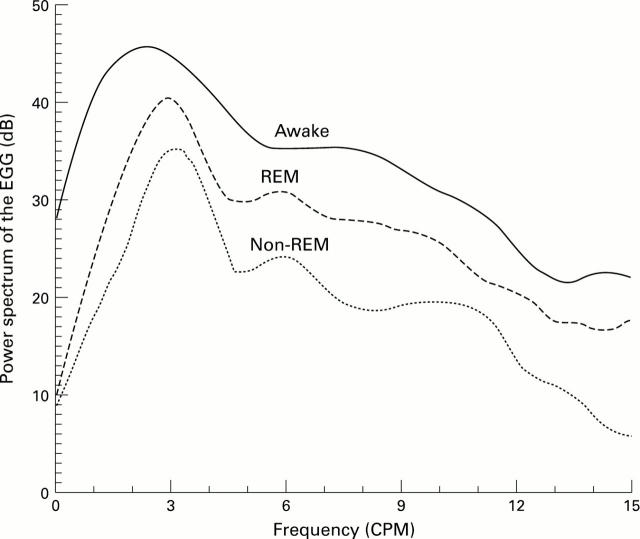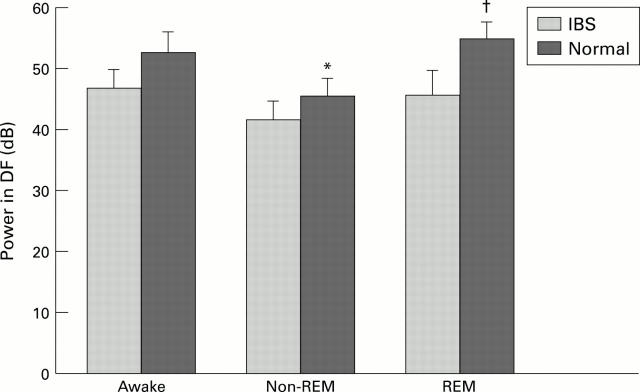Abstract
Background—Recently, several studies have shown an alteration in bowel function during sleep in patients with irritable bowel syndrome (IBS), and a recent study also suggests a remarkable increase in rapid eye movement (REM) sleep. These studies have suggested that an alteration in CNS function may play an important role in the pathogenesis of IBS. Aims—To confirm the presence of an alteration in REM sleep in patients with IBS and to assess the relation between sleep and a non-invasive measure of gastric functioning, the electrogastrogram (EGG). Patients—Ten patients with IBSand 10 age and sex matched normal volunteers. Methods—All subjects slept one night in the sleep laboratory and underwent polysomnographic monitoring to determine sleep patterns, and recording of the EGG from surface electrodes. Results—The IBS group had a notable and significant increase in the percentage and duration of REM sleep (p<0.05). The control group had a decrease in the amplitude of the dominant EGG frequency from waking to non-REM sleep (p<0.05), and a subsequent increase in the amplitude from non-REM to REM sleep (p<0.05). No such changes were noted in the patients with IBS. Conclusions—Results confirmed the enhancement of REM sleep in patients with IBS and suggested an intrinsic alteration in autonomic and CNS functioning in patients with IBS.
Keywords: sleep; irritable bowel syndrome; gastric function; brain/gut
Full Text
The Full Text of this article is available as a PDF (86.8 KB).
Figure 1 .
: Typical EGG spectral plots of a normal subject during waking, non-REM and REM sleep.
Figure 2 .
: Average amplitude of EGG dominant frequency (DF) power across waking and sleep stages in normal subjects and patients with IBS. *p<0.05 v awake; †p<0.05 v non-REM.
Selected References
These references are in PubMed. This may not be the complete list of references from this article.
- Brown B. H., Smallwood R. H., Duthie H. L., Stoddard C. J. Intestinal smooth muscle electrical potentials recorded from surface electrodes. Med Biol Eng. 1975 Jan;13(1):97–103. doi: 10.1007/BF02478194. [DOI] [PubMed] [Google Scholar]
- Camilleri M., Neri M. Motility disorders and stress. Dig Dis Sci. 1989 Nov;34(11):1777–1786. doi: 10.1007/BF01540058. [DOI] [PubMed] [Google Scholar]
- Chen J. D., Richards R. D., McCallum R. W. Identification of gastric contractions from the cutaneous electrogastrogram. Am J Gastroenterol. 1994 Jan;89(1):79–85. [PubMed] [Google Scholar]
- Drossman D. A., McKee D. C., Sandler R. S., Mitchell C. M., Cramer E. M., Lowman B. C., Burger A. L. Psychosocial factors in the irritable bowel syndrome. A multivariate study of patients and nonpatients with irritable bowel syndrome. Gastroenterology. 1988 Sep;95(3):701–708. doi: 10.1016/s0016-5085(88)80017-9. [DOI] [PubMed] [Google Scholar]
- Furukawa Y., Cook I. J., Panagopoulos V., McEvoy R. D., Sharp D. J., Simula M. Relationship between sleep patterns and human colonic motor patterns. Gastroenterology. 1994 Nov;107(5):1372–1381. doi: 10.1016/0016-5085(94)90539-8. [DOI] [PubMed] [Google Scholar]
- Gillin J. C., Wyatt R. J., Fram D., Snyder F. The relationship between changes in REM sleep and clinical improvement in depressed patients treated with amitriptyline. Psychopharmacology (Berl) 1978 Dec 8;59(3):267–272. doi: 10.1007/BF00426633. [DOI] [PubMed] [Google Scholar]
- Goldsmith G., Levin J. S. Effect of sleep quality on symptoms of irritable bowel syndrome. Dig Dis Sci. 1993 Oct;38(10):1809–1814. doi: 10.1007/BF01296103. [DOI] [PubMed] [Google Scholar]
- Jones R., Lydeard S. Irritable bowel syndrome in the general population. BMJ. 1992 Jan 11;304(6819):87–90. doi: 10.1136/bmj.304.6819.87. [DOI] [PMC free article] [PubMed] [Google Scholar]
- Kellow J. E., Gill R. C., Wingate D. L. Prolonged ambulant recordings of small bowel motility demonstrate abnormalities in the irritable bowel syndrome. Gastroenterology. 1990 May;98(5 Pt 1):1208–1218. doi: 10.1016/0016-5085(90)90335-x. [DOI] [PubMed] [Google Scholar]
- Kellow J. E., Phillips S. F. Altered small bowel motility in irritable bowel syndrome is correlated with symptoms. Gastroenterology. 1987 Jun;92(6):1885–1893. doi: 10.1016/0016-5085(87)90620-2. [DOI] [PubMed] [Google Scholar]
- Kumar D., Thompson P. D., Wingate D. L., Vesselinova-Jenkins C. K., Libby G. Abnormal REM sleep in the irritable bowel syndrome. Gastroenterology. 1992 Jul;103(1):12–17. doi: 10.1016/0016-5085(92)91089-m. [DOI] [PubMed] [Google Scholar]
- Kumar D., Wingate D. L. The irritable bowel syndrome: a paroxysmal motor disorder. Lancet. 1985 Nov 2;2(8462):973–977. doi: 10.1016/s0140-6736(85)90525-2. [DOI] [PubMed] [Google Scholar]
- Lynn R. B., Friedman L. S. Irritable bowel syndrome. N Engl J Med. 1993 Dec 23;329(26):1940–1945. doi: 10.1056/NEJM199312233292608. [DOI] [PubMed] [Google Scholar]
- Smith R. C., Greenbaum D. S., Vancouver J. B., Henry R. C., Reinhart M. A., Greenbaum R. B., Dean H. A., Mayle J. E. Psychosocial factors are associated with health care seeking rather than diagnosis in irritable bowel syndrome. Gastroenterology. 1990 Feb;98(2):293–301. doi: 10.1016/0016-5085(90)90817-k. [DOI] [PubMed] [Google Scholar]
- Smout A. J., van der Schee E. J., Grashuis J. L. What is measured in electrogastrography? Dig Dis Sci. 1980 Mar;25(3):179–187. doi: 10.1007/BF01308136. [DOI] [PubMed] [Google Scholar]
- Stern R. M., Crawford H. E., Stewart W. R., Vasey M. W., Koch K. L. Sham feeding. Cephalic-vagal influences on gastric myoelectric activity. Dig Dis Sci. 1989 Apr;34(4):521–527. doi: 10.1007/BF01536327. [DOI] [PubMed] [Google Scholar]
- Suls J., Wan C. K., Blanchard E. B. A multilevel data-analytic approach for evaluation of relationships between daily life stressors and symptomatology: patients with irritable bowel syndrome. Health Psychol. 1994 Mar;13(2):103–113. doi: 10.1037//0278-6133.13.2.103. [DOI] [PubMed] [Google Scholar]
- Thompson W. G., Heaton K. W. Functional bowel disorders in apparently healthy people. Gastroenterology. 1980 Aug;79(2):283–288. [PubMed] [Google Scholar]
- Vogel G. W., Vogel F., McAbee R. S., Thurmond A. J. Improvement of depression by REM sleep deprivation. New findings and a theory. Arch Gen Psychiatry. 1980 Mar;37(3):247–253. doi: 10.1001/archpsyc.1980.01780160017001. [DOI] [PubMed] [Google Scholar]
- Welgan P., Meshkinpour H., Beeler M. Effect of anger on colon motor and myoelectric activity in irritable bowel syndrome. Gastroenterology. 1988 May;94(5 Pt 1):1150–1156. doi: 10.1016/0016-5085(88)90006-6. [DOI] [PubMed] [Google Scholar]
- Whitehead W. E., Bosmajian L., Zonderman A. B., Costa P. T., Jr, Schuster M. M. Symptoms of psychologic distress associated with irritable bowel syndrome. Comparison of community and medical clinic samples. Gastroenterology. 1988 Sep;95(3):709–714. doi: 10.1016/s0016-5085(88)80018-0. [DOI] [PubMed] [Google Scholar]
- Whitehead W. E., Crowell M. D. Psychologic considerations in the irritable bowel syndrome. Gastroenterol Clin North Am. 1991 Jun;20(2):249–267. [PubMed] [Google Scholar]
- Zarcone V., Azumi K., Dement W., Gulevich G., Kraemer H., Pivik T. REM phase deprivation and schizophrenia II. Arch Gen Psychiatry. 1975 Nov;32(11):1431–1436. doi: 10.1001/archpsyc.1975.01760290099012. [DOI] [PubMed] [Google Scholar]
- van der Schee E. J., Grashuis J. L. Contraction-related, low-frequency components in canine electrogastrographic signals. Am J Physiol. 1983 Oct;245(4):G470–G475. doi: 10.1152/ajpgi.1983.245.4.G470. [DOI] [PubMed] [Google Scholar]




